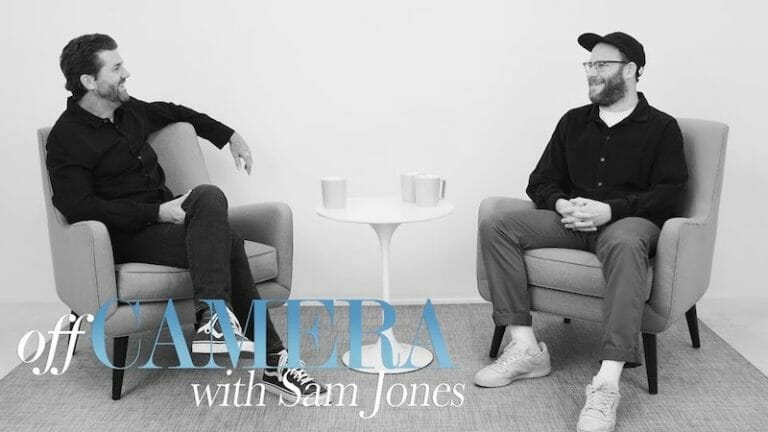By Ken Miyamoto · September 16, 2019

What are the differences between plot and story, and how do screenwriters use each of them within their screenplays?
Welcome to our ongoing Learning from the Masters and Industry Insiders series where we seek out and feature excellent videos, interviews, and discussions of the art, craft, and business of screenwriting and pull the best words of wisdom, writing tips, and screenwriting advice.
Here we turn to Off Camera with Sam Jones as he interviews prolific comedy actor, writer, and producer Seth Rogen. They discuss what it takes to connect with an audience and how plot and story serve one another.
Read More: What Is Plot?
“It’s about being able to understand what people connect to. And trusting that the thing you connect to, other people with also connect to.”
When Seth and his writing partner Evan Goldberg developed and wrote Superbad, they were basing everything on personal experiences and emotions that they had gone through and felt in their high school years.
Download the screenplay for SUPERBAD here for free.
They initially questioned whether or not their stories were too niche for the mass audience. But then realized that what they connected with had an impact on others too when the film went on to become the most successful high school movie of all time.
“There was this lesson that the more specific you make it to you, the more weirdly it has this inverse equation where it opens it up to other people. And strangely, the more specific you make it to the things you care about, the things you find interesting, the more people like it — not the less. That is something we’ve just grown to trust.”
So when you’re developing and writing screenplays, the best thing that you can do to connect with an audience is to be honest and pulls stories from your life that others will likely relate to.
We are all very much alike.
“[Former Sony Pictures CEO] Amy Pascal, years ago, told me a quote from Robert Towne that was, ‘A good movie, at the start, the thing that seems most important is actually the least important. And the thing that seems the least important is actually the most important.'”
He goes on to explain that with Superbad, the most important thing for the characters seemed to be about getting laid. But throughout the story, it’s about their friendship and the fear of it not lasting when they attend different colleges.
When you’re developing your screenplays, it helps to find what many call an initial physical need. In Die Hard, McClane needs to save the hostages. But then we see that there’s an emotional need beyond that — reconnecting with his wife and understanding what he did wrong in the marriage.
Download the screenplay for DIE HARD here for free.
The plot is him needing to save the hostages. The story is him struggling to accomplish that while facing the fears of losing his wife after being a flawed husband.
“It’s tricking the audience. It’s luring them in with plot and giving them stories… plot is the things that are happening and the story is what it’s actually about. The plot should be the thing that seems to be the most important at first, and the story should be in there, almost recognizable, but as the movie goes on, that ratio should reverse itself.”
That’s how you trick Hollywood to buying your story as well. You give them a high concept plot so they can sell it to their bosses, investors, and distributors, but you inject outstanding drama, story themes, and characterization within — essentially tricking them into buying what is really a great character piece.
Watch the whole video for Seth Rogen’s elaboration on plot versus story!
For all the latest from The Script Lab, be sure to follow us on Twitter, Facebook, and Instagram.
And become a member of TSL 360 to enjoy the LARGEST screenwriting education content library, featuring masterclasses, deep-dive interviews, and lectures from Academy Award-winning screenwriters, TV show-runners, producers, literary managers, agents, studio executives, and leading educators – all in one place.